
CANON FODDER
page 4
christopher funderburg
françois truffaut & jean-luc godard's
TOP 10 FILMS OF 1957
A KING IN NEW YORK & BEYOND A REASONABLE DOUBT
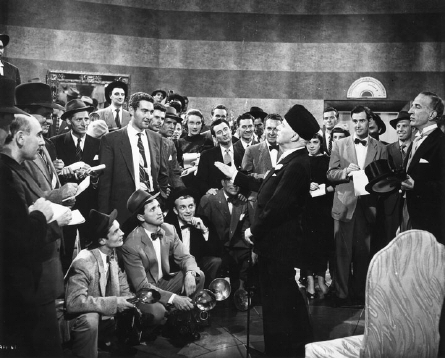
Making excuses for great directors.
As I mentioned in regards to The Wrong Man and Nicholas Ray, the Cahiers critics specialized in a critical steadfastness: highlighting Charlier Chaplin's last feature and one of Fritz Lang's absolute worst films is an elite level exercise in making excuses for great directors in order to bolster the auteur theory. Both films border on incompetence, there's no denying these are tedious films; and yet that only serves to make Truffaut and Godard more committed to the cause. They search through the films for moments and gestures that support their ideas while ignoring the evidence against them - in statiscal analysis it would be described as "data mining" and call into question their findings. Still, I can understand where they're coming from. I'd much rather give another chance to a bad film from a director I love (like, say, watch Claire Denis' Trouble Every Day again even though I did not like it) than go see some of that garbage hastily converted to 3-D that's filling up theaters. I really do believe that the idea of making excuses for preferred filmmakers is the driving force behind the auteur theory - it's a theory with a lot of obvious and irreconciable holes (with film as one of the most collaborative arts and screenwriters, producers, directors and, even in the case of someone like Chaplin, actors all having legitimate claims to "auteur" status), but the germ of it is so resilient because of the natural human tendency to make excuses for the people we like, to lionize and to see threads of brilliance in the emperor's new clothes. Since I am not a diehard Chaplin fan, it's easy enough for me to disregard A King in New York as a sour and didatic film by an aging filmmakers whose natural talents for physical comedy and melodrama have all but abandoned him. However, there are many mediocre Buster Keaton films that I'm sure you could bait me into arguing are peerlessly brilliant - that's just the way it goes, even for critics who have tried to make it a point of overcoming their biases and blind-spots. For unrepentant partisans like Truffuat and Godard, there's even less of a reason to offer a damning critique of a middling late-period work like A King in New York or stumbling, bumbling studio-backed filler like Beyond a Reasonable Doubt.
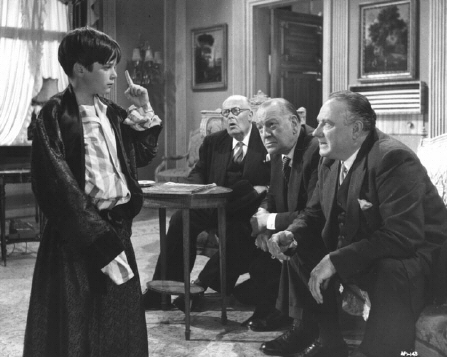 When Chaplin made A King in New York, he was almost 70 years old and suffering through an exile in Europe forced in large part by House Un-American Activites Committee bullying - Chaplin admitted a past with the Communist party and HUAC (led by Senator Joe "I have a list of 76 liquor stores in my hand" McCarthy) had played its typical games with him, calling him before the committee and demanding he rat out his friends. Pulling a proto-Kubrick, A King was produced in Britain with a mainly British cast pretending to be a bunch of Americans in New York. That's surprisingly one of the more effective elements of the film - London ends up standing in for NYC just fine in the story of a desposed monarch played by Chaplin who finds himself penniless in the Big Apple. The leaden plot follows the monarch's efforts to get support for his world-altering idea to harness the power of the mighty atom for good, not destructive, purposes. Before too long, however, through a series of convolutions, the monarch ends up summoned before a show-boating government commission and forced to testify against his friends. He ends up accidentally dousing them all with a firehose. The film got middling reviews upon its release in the U.K., did mediocre business and quickly developed a reputation for anti-Americanism, so Chaplin's swan song never recieved an American theatrical release - it was trotted out as a repertory rediscovery decades later, but remained virtually unseen in the interim. The film's troubled history is far more interesting than the thing itself and without the semi-autobiographic components, it wouldn't have any punch at all. Like most Chaplin films, it has long stretches where no comedy is even attempted (even his ardent admirers should be able to admit that he's not a Buster Keaton or Zucker Bros. style joke-a-second gagster), but instead of charming melodrama like in City Lights or ticking-bomb set-ups for glorious set-pieces like in Modern Times, the comedy-deficient holes are filled with endless, cloying, self-important monologues. As an added bonus, the earnest monologues are delivered by Chaplin's own 10-year old son, Michael. The precocious, America-loving tyke goes on and on about what great nation we have here and how frustrating it is for the country to have lost its way with all these totally Un-American special committee witch hunts. It's an American tragedy, a betrayal of our finest ideals, an injustice marring what was once a noble beacon of freedom and liberty. Just remembering these scenes, I'm ready to punch myself in the face.
When Chaplin made A King in New York, he was almost 70 years old and suffering through an exile in Europe forced in large part by House Un-American Activites Committee bullying - Chaplin admitted a past with the Communist party and HUAC (led by Senator Joe "I have a list of 76 liquor stores in my hand" McCarthy) had played its typical games with him, calling him before the committee and demanding he rat out his friends. Pulling a proto-Kubrick, A King was produced in Britain with a mainly British cast pretending to be a bunch of Americans in New York. That's surprisingly one of the more effective elements of the film - London ends up standing in for NYC just fine in the story of a desposed monarch played by Chaplin who finds himself penniless in the Big Apple. The leaden plot follows the monarch's efforts to get support for his world-altering idea to harness the power of the mighty atom for good, not destructive, purposes. Before too long, however, through a series of convolutions, the monarch ends up summoned before a show-boating government commission and forced to testify against his friends. He ends up accidentally dousing them all with a firehose. The film got middling reviews upon its release in the U.K., did mediocre business and quickly developed a reputation for anti-Americanism, so Chaplin's swan song never recieved an American theatrical release - it was trotted out as a repertory rediscovery decades later, but remained virtually unseen in the interim. The film's troubled history is far more interesting than the thing itself and without the semi-autobiographic components, it wouldn't have any punch at all. Like most Chaplin films, it has long stretches where no comedy is even attempted (even his ardent admirers should be able to admit that he's not a Buster Keaton or Zucker Bros. style joke-a-second gagster), but instead of charming melodrama like in City Lights or ticking-bomb set-ups for glorious set-pieces like in Modern Times, the comedy-deficient holes are filled with endless, cloying, self-important monologues. As an added bonus, the earnest monologues are delivered by Chaplin's own 10-year old son, Michael. The precocious, America-loving tyke goes on and on about what great nation we have here and how frustrating it is for the country to have lost its way with all these totally Un-American special committee witch hunts. It's an American tragedy, a betrayal of our finest ideals, an injustice marring what was once a noble beacon of freedom and liberty. Just remembering these scenes, I'm ready to punch myself in the face.
The charges of anti-Americanism are fascinating in the context of Truffaut and Godard because watching the film, I can see how Chaplin probably thought he was trying to champion America's true ideals of freedom and liberty, but also how it all could've come across to European audiences as nothing more than "yeah, those Americans sure are clueless, hypocritical chumps." It's a perfect film for Truffaut and especially Godard in some ways because they were both so clearly attracted to their repulsion for America. A King in New York is in many ways as mirror of Frank Tashlin's work, a dour and jaded satire that chooses many of the same targets as the bright and bubbly The Girl Can't Help It! and Will Success Spoil Rock Hunter? Chaplin even takes a swipe at the Cinemascope format (which he considered to be a pointless, cheap gimick) that recalls The Girl Can't Help It!'s gag intro trumpeting widescreen. The difference between the films in question can be reduced to the fact that Frank Tashlin seems to get a kick out of all of America's crazy excesses while the very aspects of 50's culture that amuse Tashlin (like rock n' roll and Fantastic New Products) clearly depress Chaplin. And that sourness makes many of the jokes fall flat - A King in New York's scene at a rock concert features both the performers and audience falling on the floor and writhing around while screeching hysterically and the portrayal is so bitter as to border on nightmarish. The film's whole problem is that the satire frequently borders on humorless, as though the comedy is an afterthought to the satirical points Chaplin is trying to make. Chaplin lines up a lot of axes to grind and only occassionally seems to care if what he's doing is actually entertaining. I'm sure Truffaut and Godard were more than a little pleased to see such grievances being blatantly aired and no doubt cut the film a lot of slack for that reason alone. Attempting to view films through the cloud of history and figure out the murky political points of view of several folks is a losing game, but with A King in New York there's no other way to approach the film.
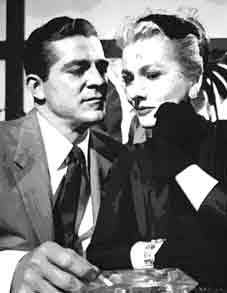 Beyond a Reasonable Doubt is another cruddy film from a legendary filmmaker, a genius whose talents are in scant evidence in the film in question. For me, Doubt really was frustrating to watch becuase Fritz Lang's talents really are undeniable and they're just completely absent from the film. M ranks among my favorite films of all time, certainly in my own Top 10, while his amazingly inventive and varied work in Weimar era Germany can impressively be said to have inspired both Luis Buñuel (who wrote "When I saw Destiny, I
suddenly knew that I wanted too make movies... Something
about this film spoke to something deep in me; it clarified my
life and
my vision of the world.") and Steven Spielberg (with the Indiana Jones-template The Spiders.) That Lang could be such a force of imagination and genius and still churn out an ill-concieved mess like Beyond a Reasonable Doubt is not altogether surprising - what's so shocking is that he botches such a pedestrian project; if it were a massive undertaking of sprawling ambition like Metropolis and he dropped the ball, I could understand. But a middling courtroom drama? Gah. Doubt's two primary problems are a terrible male lead in Dana Andrews and a ridiculous plot that keeps piling lame-brained twists on top of each other in the final third. Andrews plays a reporter convinced that the death penalty is terrible idea, so goes about framing himself for a murder he didn't commit in order to prove that the system stinks. He plans to hold back exculpatory evidence until the last second (after his conviction) and then write a scathing exposé of the American justice system - and in the process derail the political career of a dastardedly D.A. with a reputation built on convictions, innocence or justice be damned. But the car containing the evidence gets into an accident and the evidence gets burned up and the guy in charge of the evidence (the only person aware of Andrews' scheme) sent to the hospital in critical condition! But, wait, actually Andrews committed the murders afterall (what?), so the exculpatory evidence was fake and he deserves to go to prison. But his fiancée isn't convinced of his guilt, so she works to get him out of jail! But he reveals that he's actually the murderer and wants to be punished! So, he's put to death after a last second anti-reprieve! The whole thing ludicrous and Andrews can't come close to pulling off all the various conflicting facets of his poorly written character. It's all too much and Lang clearly doesn't give a shit, every scene is filmed in the standard Hollywood style - it could have been directed by anybody.
Beyond a Reasonable Doubt is another cruddy film from a legendary filmmaker, a genius whose talents are in scant evidence in the film in question. For me, Doubt really was frustrating to watch becuase Fritz Lang's talents really are undeniable and they're just completely absent from the film. M ranks among my favorite films of all time, certainly in my own Top 10, while his amazingly inventive and varied work in Weimar era Germany can impressively be said to have inspired both Luis Buñuel (who wrote "When I saw Destiny, I
suddenly knew that I wanted too make movies... Something
about this film spoke to something deep in me; it clarified my
life and
my vision of the world.") and Steven Spielberg (with the Indiana Jones-template The Spiders.) That Lang could be such a force of imagination and genius and still churn out an ill-concieved mess like Beyond a Reasonable Doubt is not altogether surprising - what's so shocking is that he botches such a pedestrian project; if it were a massive undertaking of sprawling ambition like Metropolis and he dropped the ball, I could understand. But a middling courtroom drama? Gah. Doubt's two primary problems are a terrible male lead in Dana Andrews and a ridiculous plot that keeps piling lame-brained twists on top of each other in the final third. Andrews plays a reporter convinced that the death penalty is terrible idea, so goes about framing himself for a murder he didn't commit in order to prove that the system stinks. He plans to hold back exculpatory evidence until the last second (after his conviction) and then write a scathing exposé of the American justice system - and in the process derail the political career of a dastardedly D.A. with a reputation built on convictions, innocence or justice be damned. But the car containing the evidence gets into an accident and the evidence gets burned up and the guy in charge of the evidence (the only person aware of Andrews' scheme) sent to the hospital in critical condition! But, wait, actually Andrews committed the murders afterall (what?), so the exculpatory evidence was fake and he deserves to go to prison. But his fiancée isn't convinced of his guilt, so she works to get him out of jail! But he reveals that he's actually the murderer and wants to be punished! So, he's put to death after a last second anti-reprieve! The whole thing ludicrous and Andrews can't come close to pulling off all the various conflicting facets of his poorly written character. It's all too much and Lang clearly doesn't give a shit, every scene is filmed in the standard Hollywood style - it could have been directed by anybody.
Again, this really seems like a case of Godard wanting to like something and grasping at straws for a reason. Again, I think the cases can be made that he's heavily invested in the auteur theory's success and liable to tout bad movies by good directors under those auspices, that he probably approved the film's cynical and somewhat ridiculous portrayal of an important American institution like our justice system, that he basked in his iconoclasm and loved going to bat for a movie that most folks (rightly) dismissed as a silly pot-boiler made with indifference and minimal competence. Truffaut wrote about the film, "The critics were outraged by the plot, but it shouldn't have been surprising coming from a man the world had confirmed as a rebel. In Beyond a Reasonable Doubt his rebellion turned to disgust." For the Cahiers critics, the appeal of a filmmaker like Lang (or Chaplin or Guitry) is his "rebel" status, the fact that he bucks convention at every turn and fits "the ideal figure of the free man, above convention, indifferent to the judgment of contemptuous intellectuals and the condemnations of political conscience." Or, at least, they figured that was the best well to sell unpopular products: trumpet the misunderstood, outsider element. But their appraisal of Beyond a Reasonable Doubt shows just how far they were willing to deviate from reality in order to make their case; I have no doubt that Lang, who fled his homeland from Nazi persecution in the 30's, felt very passionately about the complicated nature of justice (and the injustice inexorably tied to it) the but "critics were outraged by the plot" of Beyond a Reasonable Doubt for the simple reason that it's so freakin' stupid. Sometimes, it really is that simple. Their advocacy on behalf of these film represents the worst they have to offer, amounting to little more than a juvenile "you just don't get it, man." As much as history can cloud things up, it can of course also provide some perpsective and, while I can accept that some folks genuinely enjoy either A King in New York or Beyond a Reasonable Doubt, Truffaut and Godard's thin defense of both works is objectively wrong.
SAWDUST AND TINSEL &THE CRIMINAL LIFE OF ARCHIBALDO DE LA CRUZ
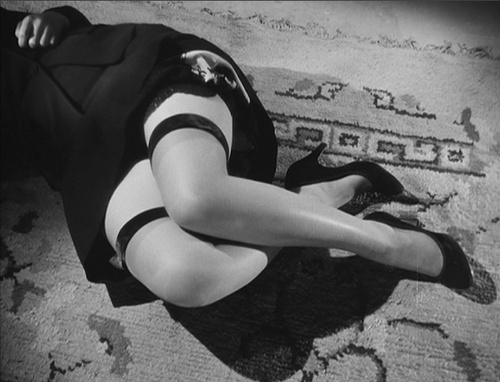
Minor films from major figures.
The flipside to the A King in New York/Beyond a Reasonable Doubt coin, Truffaut and Godard's endorsement of relatively unknown films from Ingmar Bergman and Luis Buñuel represents the best that the auteur theory and dogged inconoclasm has to offer: shining a spotlight on worthy films that could easily be lost to history. I think that The Criminal Life of Archibaldo de la Cruz can easily stand beside any of Buñuel's "lightly flawed but frequently brilliant" works like That Obscure Object of Desire or The Milky Way, while Sawdust and Tinsel finds (the lifelong stage director) Bergman in an overtly theatrical mode that recalls his similarly flamboyant work like Smiles of a Summer Night - it actually resembles his later work more than his celebrated early films like Monika do. These are two surprisingly great films generally overlooked in the oeuvre of their iconic directors - when I wrote about de la Cruz previously, I was shocked that such a good film from such a well-known filmmaker could have such a meagre reputation; I was even more shocked to find out that Sawdust and Tinsel isn't just a gag title from Naked Gun 33 & 1/3, let alone a fine film in its own right. As a matter of fact, there's not much chance I would've revisited de la Cruz without this project (therefore, on Truffaut and Godard's recommendation) and, as someone who only likes Bergman well enough, absolutely no way I would've sought out Sawdust and Tinsel. If there's any reason to compile yearly "Best of" lists or put forth a theory that implies there is significant value in most everything produced by certain filmmakers, my experience with these films is that reason. I'm still not sure how the 1953 Sawdust and Tinsel qualifies for Godard's 1957 list, but it's cool, I'll go with it. Certainly, it doesn't surprise me that both Truffaut and Godard ignored the 1957 Bergman consensus classic that put the "pretentious" in "pretentious foreign film," The Seventh Seal.* Personally, I think The Seventh Seal put the "euphuistic" in "brooding euphuistic art cinema," but that's just me, just my opinion.
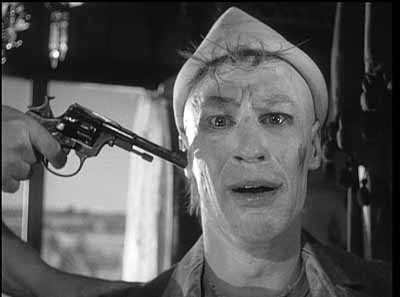 Sawdust and Tinsel concerns the ringleader of seedy travelling circus and his malcontent mistress (Harriet Anderson, of course) - when the ringmaster decides to return home to his wife after 3 solid years of cricus travel, Anderson turns to a sleazebag actor in troupe played by Hasse Eckman. Eckman is the "Bergman special" a repugnant character that seems like the villain, but whose repulsive personality and actions are actually inseperable from his treatment by the supposedly more benevolent characters around him. Sure, he seems like he's a scummy lech when Anderson comes to him for consolation, but her increasingly cruel "justified" response to his behavior sets his personality in stone: he builds himself self, she tears him down... then continues to tear him, eventually tearing him to pieces... and what can he do but buld himself back up? Should he accept her cruelties without compunction? Especially late in his career, Bergman always features this character, the awful man (or woman) in reality under constant, unfair, cruel assault. Maybe part of the reason (perversely) that Sawdust and Tinsel has been forgotten is that it reminded me a lot of other much more famous films - the traveling circus setting recalls Bergman's own The Seventh Seal and the climax that takes place in the center ring of the circus resembles the stage-bound hypnosis sequence that it is many ways the crux of another film I'll be writing about shortly, Nights of Cabiria. The comparison to Fellini, as odd as it may seem, doesn't end there - the overlooked fact of Bergman is that he often made cacophonous, carnival-esque pseudo-comedies which are constantly intruded upon by dark drama; that seems like a legit description of Fellini as well. Maybe because it reminds me of Fellini and Bergman's most classically lauded work, I've very surprised to see it turn up on Godard's list. The feckless emotional cruelty rampant in a film taking special care with its female characters is something Sawdust and Tinsel (and Bergman's work in general) shares with seminal Godard works like Vivre Sa Vie, Breathless and Contempt... but I still don't see much of Godard in Sawdust.
Sawdust and Tinsel concerns the ringleader of seedy travelling circus and his malcontent mistress (Harriet Anderson, of course) - when the ringmaster decides to return home to his wife after 3 solid years of cricus travel, Anderson turns to a sleazebag actor in troupe played by Hasse Eckman. Eckman is the "Bergman special" a repugnant character that seems like the villain, but whose repulsive personality and actions are actually inseperable from his treatment by the supposedly more benevolent characters around him. Sure, he seems like he's a scummy lech when Anderson comes to him for consolation, but her increasingly cruel "justified" response to his behavior sets his personality in stone: he builds himself self, she tears him down... then continues to tear him, eventually tearing him to pieces... and what can he do but buld himself back up? Should he accept her cruelties without compunction? Especially late in his career, Bergman always features this character, the awful man (or woman) in reality under constant, unfair, cruel assault. Maybe part of the reason (perversely) that Sawdust and Tinsel has been forgotten is that it reminded me a lot of other much more famous films - the traveling circus setting recalls Bergman's own The Seventh Seal and the climax that takes place in the center ring of the circus resembles the stage-bound hypnosis sequence that it is many ways the crux of another film I'll be writing about shortly, Nights of Cabiria. The comparison to Fellini, as odd as it may seem, doesn't end there - the overlooked fact of Bergman is that he often made cacophonous, carnival-esque pseudo-comedies which are constantly intruded upon by dark drama; that seems like a legit description of Fellini as well. Maybe because it reminds me of Fellini and Bergman's most classically lauded work, I've very surprised to see it turn up on Godard's list. The feckless emotional cruelty rampant in a film taking special care with its female characters is something Sawdust and Tinsel (and Bergman's work in general) shares with seminal Godard works like Vivre Sa Vie, Breathless and Contempt... but I still don't see much of Godard in Sawdust.
Godard referred to Bergman as "the most original film-maker of the European Cinema," but in a typically Godardian fasion, doesn't do much to clairfy what he means by that. He singles out Sawdust and Tinsel as a particularlly "original" film, but his exhortation of Bergman in the excellently titled essay "Bergmanorama" revolves around why he doesn't feel like clarifying himself on the subject at hand:
"There are five or six films in the history of the cinema which one wants to review simply by saying, 'It is the most beautiful of films.' Because there can be no higher praise. Why say more, in effect, about Tabu, Voyage to Italy or Le Carrosse d'or? Like the starfish that opens and closes, they can reveal or conceal the secret of a world of which they are the sole repository and also the fascinating reflection. Truth is their truth. They secrete it deep within themselves, and yet with each shot the screen is rent to scatter it to the winds. To say of them, 'It is the most beautiful of films', is to say everything. Why? Because it just is. Only the cinema can permit this sort of childish reasoning without pretending shame. Why? Because it is the cinema. And because the cinema is sufficient unto itself."
Only Godard could get away with writing "Because it just is." in an article and still being taken seriously. Certainly, he's always willing to permit himself that sort of childish reasoning and he's definitely not one to pretend to shame. Anyway, Godard views Bergman as a romantic and it's funny: I would characterize Bergman as a cynic... but I think that the poetry of Bergman's cynicism is precisely wherein Godard locates the flame of romanticism (to write in it in Godard-speak.) Bergman and Godard share an innate cynicism that would harden over the course of their careers, their late-period works ensconced in a scuffed shell of scornful and jaded negativity. I think the difference is that until his death Bergman still struggled to understand humanity, while Godard appears to have given up on bothering with people altogether. Also, I'm curious if Godard ever wrote an essay that didn't evoke some Mytholigized notion of Le Cinema.
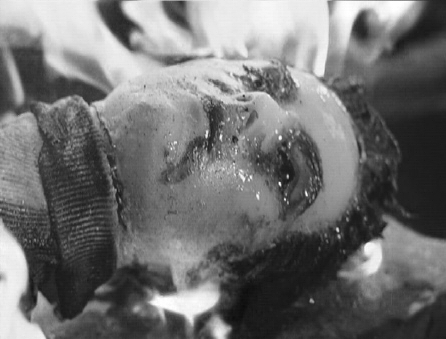 On the other end of the tonal spectrum, both Truffaut and Godard singled out the hugely enjoyable The Criminal Life of Archibaldo de la Cruz. Buñuel's film, a sex comedy (of sorts) from his commercial Mexican phase, tackles a lot of the same subjects as Sawdust and Tinsel but with an enthusiasm for perversion and depravity that smashes together lust and violence with Buñuel's deadpan sense of humor. The plot: in his childhood, an aristocratic man witnessed the death of his beautiful nurse when a stray bullet from a revolutionary's gun crashed through the window of his family's mansion. As the nurse slumps to the ground, her black stockings and garter belt are revealed and a musicbox plays a tune. Now, as a grown man, the aristocrat recovers the music box and its tune reignites that youthful erotic charge of seeing his dead nurse's comely thighs; he devises a plan to fully re-experience that overwhelming moment of his childhood: he will murder his beautiful young fiancée. Truffaut's fascination with the film focuses on the pseudo-Hitchcockian trickery: "If you question the audience at the end... almost everybody will tell
you that they've just seen the story of a likable guy who kills women.
It is absolutely not true; Archibaldo has killed no one." Truffaut is, of course, right - Archibadlo merely practices his crime several times over (hence the Spanish title, Ensayo de en Crimen, which translates as "Practice of the Crime.") But Archibaldo's actions, particularly the strangulation and incineration of a mannequin are genuinely queasy and shocking - those sequences feel exactly as disturbing as other murder one witnesses on screen. The double trick of it is that Buñuel and star Ernesto Alonso make de la Cruz into such a likable guy - it's the story of a murderer who isn't and a likable guy whom you should detest.
On the other end of the tonal spectrum, both Truffaut and Godard singled out the hugely enjoyable The Criminal Life of Archibaldo de la Cruz. Buñuel's film, a sex comedy (of sorts) from his commercial Mexican phase, tackles a lot of the same subjects as Sawdust and Tinsel but with an enthusiasm for perversion and depravity that smashes together lust and violence with Buñuel's deadpan sense of humor. The plot: in his childhood, an aristocratic man witnessed the death of his beautiful nurse when a stray bullet from a revolutionary's gun crashed through the window of his family's mansion. As the nurse slumps to the ground, her black stockings and garter belt are revealed and a musicbox plays a tune. Now, as a grown man, the aristocrat recovers the music box and its tune reignites that youthful erotic charge of seeing his dead nurse's comely thighs; he devises a plan to fully re-experience that overwhelming moment of his childhood: he will murder his beautiful young fiancée. Truffaut's fascination with the film focuses on the pseudo-Hitchcockian trickery: "If you question the audience at the end... almost everybody will tell
you that they've just seen the story of a likable guy who kills women.
It is absolutely not true; Archibaldo has killed no one." Truffaut is, of course, right - Archibadlo merely practices his crime several times over (hence the Spanish title, Ensayo de en Crimen, which translates as "Practice of the Crime.") But Archibaldo's actions, particularly the strangulation and incineration of a mannequin are genuinely queasy and shocking - those sequences feel exactly as disturbing as other murder one witnesses on screen. The double trick of it is that Buñuel and star Ernesto Alonso make de la Cruz into such a likable guy - it's the story of a murderer who isn't and a likable guy whom you should detest.
I've written too much already about Archibadlo de la Cruz, so I'll just bring my discussion of it back to Sawdust and Tinsel and Godard and Truffaut in general. I think that there's something pretty cool about them both singling out Buñuel's film and Godard highlighting Bergman's - it's tempting for me to constantly poke at their ideas, especially since both of them are so unflinchingly bombastic and doggedly idiosyncratic, but they really do appear to be searching for the best films and dedicated to looking where no one else is. In 1957, Buñuel couldn't even get his film released in the U.S. and to this day very few folks even bother seeing the films from his Mexican commercial phase - an unclassifiable murder-sex-comedy anchored by a sly performance a telenovela star probably didn't even cross the mind of most established critics when they were making up their "Best of" lists for the year (if they had even bothered to see it.) And Godard had the prescience to understand what made Bergman unique and to single out the early film that would most resemble his cinema-changing masterpieces - when others were focused on simple relationship melodramas like Monika and Port of Call, Godard saw that Sawdust and Tinsel would grow up to be The Seventh Seal. As easy as it is to take jabs at them for selecting Hollywood or Bust and Beyond a Reasonable Doubt, I've got to give credit where credit is due: critical eyes had to be forced open because prior to the Cahiers revolution great films like The Criminal Life of Archibaldo de la Cruz and Sawdust and Tinsel simply weren't being seen, let alone seen for what they were.
* Although, I feel like I should mention that Godard seems to like The Seventh Seal when he writes about it. It still doesn't surprise me that it's not on his list - as I've written, he's too committed to contrarianism to come out vocally in favor of a film already in 1957 being buried under mountains of praise. Seriously, look at his list again - it's kinda insane.
<<Previous Page 1 2 3 4 5 Next Page>>
home about contact us featured writings years in review film productions
All rights reserved The Pink Smoke © 2010